5ICM - Coaching and Mentoring Program Implementation: A Business Brief
VerifiedAdded on 2023/06/12
|17
|4606
|408
Report
AI Summary
This report provides an overview of coaching and mentoring in organizations, highlighting their similarities and differences, purposes, and key benefits for stakeholders. It discusses various types of coaching and mentoring, including performance, career, executive, peer, online, and line manager mentoring. The role of line managers in these processes is evaluated, and five critical factors for successful implementation are identified: clear purpose, alignment with organizational values, defined roles, the degree of intervention required, and financial implications. The report concludes with recommendations for organizations to maximize the impact of their coaching and mentoring programs, emphasizing the importance of aligning these initiatives with organizational objectives and utilizing appropriate analysis tools. Desklib provides access to solved assignments and past papers for students.
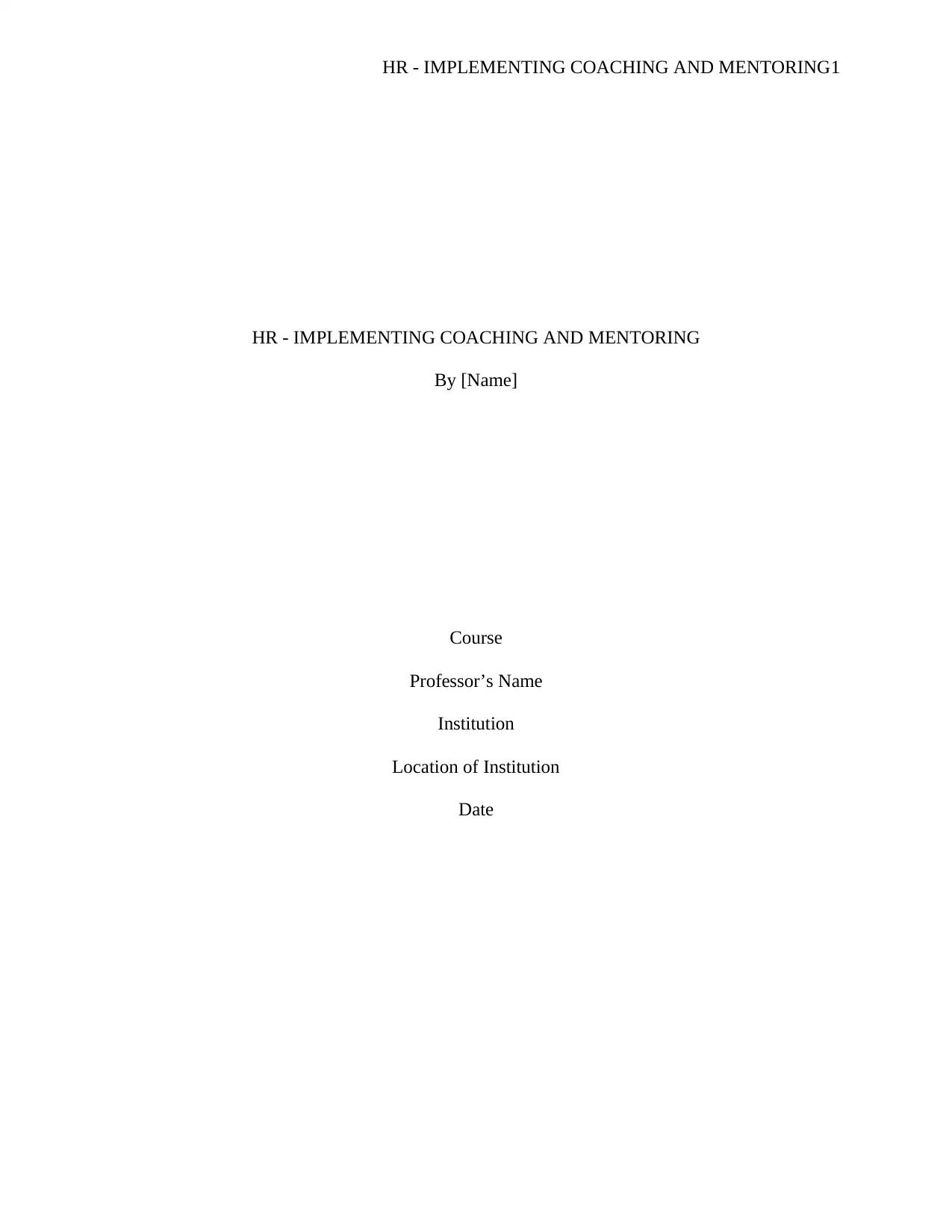
HR - IMPLEMENTING COACHING AND MENTORING1
HR - IMPLEMENTING COACHING AND MENTORING
By [Name]
Course
Professor’s Name
Institution
Location of Institution
Date
HR - IMPLEMENTING COACHING AND MENTORING
By [Name]
Course
Professor’s Name
Institution
Location of Institution
Date
Paraphrase This Document
Need a fresh take? Get an instant paraphrase of this document with our AI Paraphraser
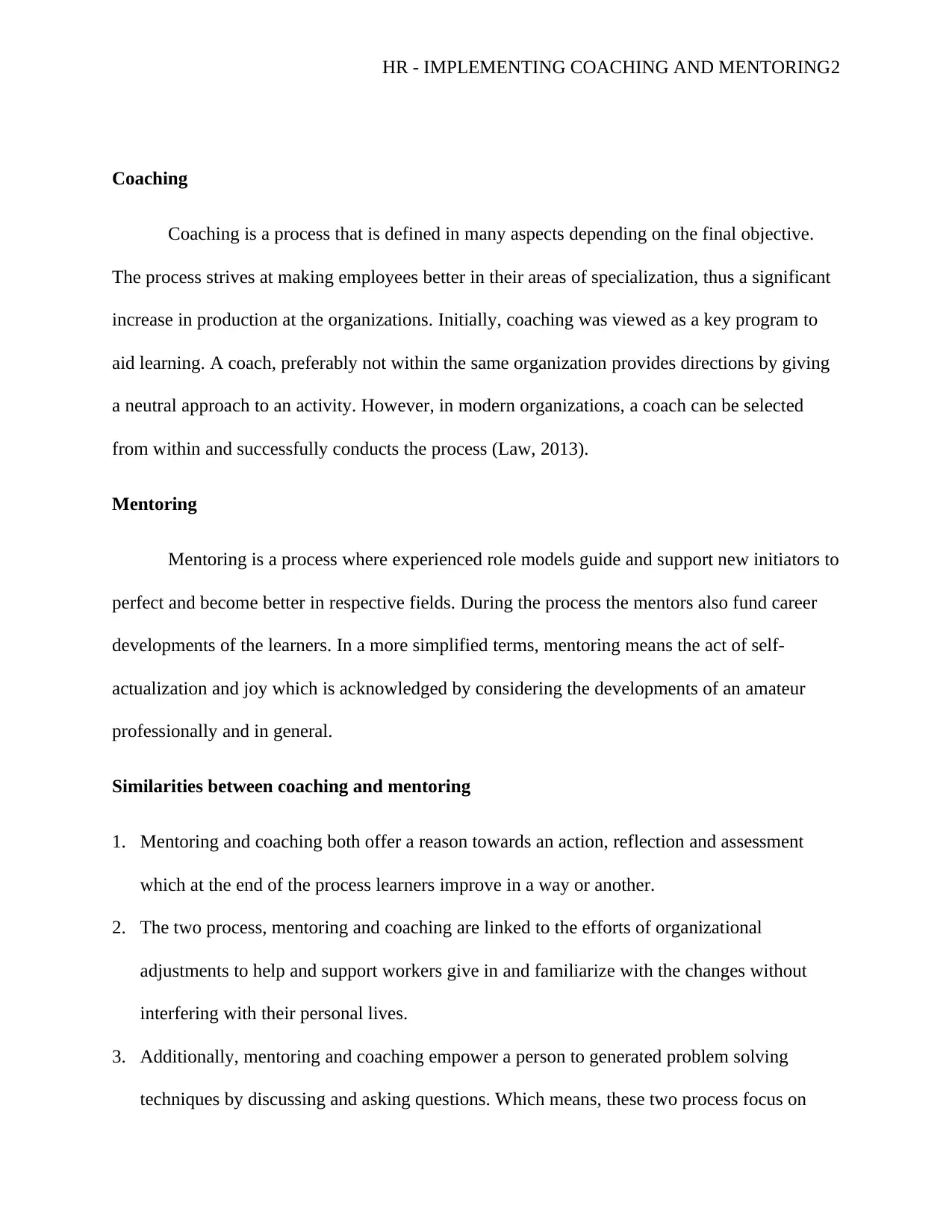
HR - IMPLEMENTING COACHING AND MENTORING2
Coaching
Coaching is a process that is defined in many aspects depending on the final objective.
The process strives at making employees better in their areas of specialization, thus a significant
increase in production at the organizations. Initially, coaching was viewed as a key program to
aid learning. A coach, preferably not within the same organization provides directions by giving
a neutral approach to an activity. However, in modern organizations, a coach can be selected
from within and successfully conducts the process (Law, 2013).
Mentoring
Mentoring is a process where experienced role models guide and support new initiators to
perfect and become better in respective fields. During the process the mentors also fund career
developments of the learners. In a more simplified terms, mentoring means the act of self-
actualization and joy which is acknowledged by considering the developments of an amateur
professionally and in general.
Similarities between coaching and mentoring
1. Mentoring and coaching both offer a reason towards an action, reflection and assessment
which at the end of the process learners improve in a way or another.
2. The two process, mentoring and coaching are linked to the efforts of organizational
adjustments to help and support workers give in and familiarize with the changes without
interfering with their personal lives.
3. Additionally, mentoring and coaching empower a person to generated problem solving
techniques by discussing and asking questions. Which means, these two process focus on
Coaching
Coaching is a process that is defined in many aspects depending on the final objective.
The process strives at making employees better in their areas of specialization, thus a significant
increase in production at the organizations. Initially, coaching was viewed as a key program to
aid learning. A coach, preferably not within the same organization provides directions by giving
a neutral approach to an activity. However, in modern organizations, a coach can be selected
from within and successfully conducts the process (Law, 2013).
Mentoring
Mentoring is a process where experienced role models guide and support new initiators to
perfect and become better in respective fields. During the process the mentors also fund career
developments of the learners. In a more simplified terms, mentoring means the act of self-
actualization and joy which is acknowledged by considering the developments of an amateur
professionally and in general.
Similarities between coaching and mentoring
1. Mentoring and coaching both offer a reason towards an action, reflection and assessment
which at the end of the process learners improve in a way or another.
2. The two process, mentoring and coaching are linked to the efforts of organizational
adjustments to help and support workers give in and familiarize with the changes without
interfering with their personal lives.
3. Additionally, mentoring and coaching empower a person to generated problem solving
techniques by discussing and asking questions. Which means, these two process focus on
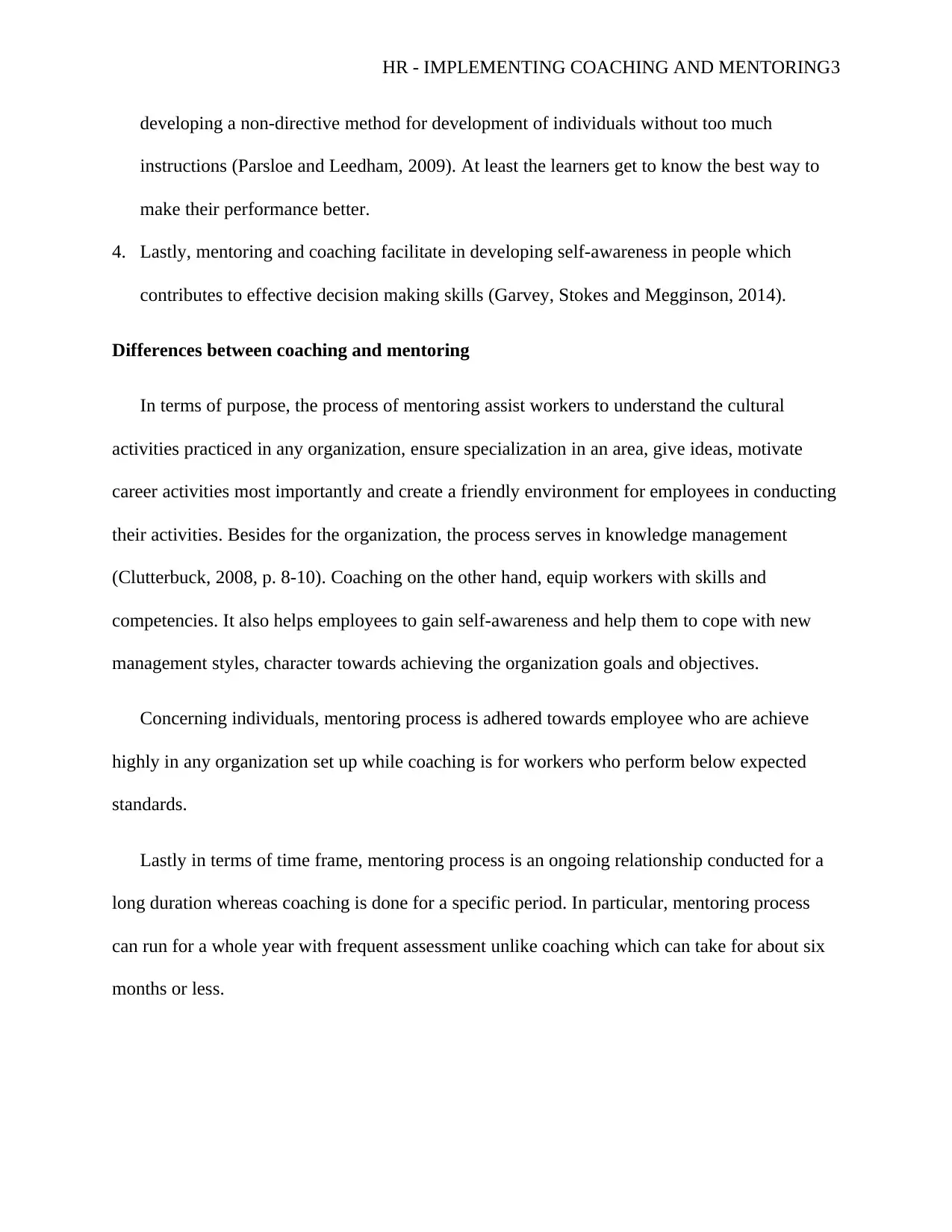
HR - IMPLEMENTING COACHING AND MENTORING3
developing a non-directive method for development of individuals without too much
instructions (Parsloe and Leedham, 2009). At least the learners get to know the best way to
make their performance better.
4. Lastly, mentoring and coaching facilitate in developing self-awareness in people which
contributes to effective decision making skills (Garvey, Stokes and Megginson, 2014).
Differences between coaching and mentoring
In terms of purpose, the process of mentoring assist workers to understand the cultural
activities practiced in any organization, ensure specialization in an area, give ideas, motivate
career activities most importantly and create a friendly environment for employees in conducting
their activities. Besides for the organization, the process serves in knowledge management
(Clutterbuck, 2008, p. 8-10). Coaching on the other hand, equip workers with skills and
competencies. It also helps employees to gain self-awareness and help them to cope with new
management styles, character towards achieving the organization goals and objectives.
Concerning individuals, mentoring process is adhered towards employee who are achieve
highly in any organization set up while coaching is for workers who perform below expected
standards.
Lastly in terms of time frame, mentoring process is an ongoing relationship conducted for a
long duration whereas coaching is done for a specific period. In particular, mentoring process
can run for a whole year with frequent assessment unlike coaching which can take for about six
months or less.
developing a non-directive method for development of individuals without too much
instructions (Parsloe and Leedham, 2009). At least the learners get to know the best way to
make their performance better.
4. Lastly, mentoring and coaching facilitate in developing self-awareness in people which
contributes to effective decision making skills (Garvey, Stokes and Megginson, 2014).
Differences between coaching and mentoring
In terms of purpose, the process of mentoring assist workers to understand the cultural
activities practiced in any organization, ensure specialization in an area, give ideas, motivate
career activities most importantly and create a friendly environment for employees in conducting
their activities. Besides for the organization, the process serves in knowledge management
(Clutterbuck, 2008, p. 8-10). Coaching on the other hand, equip workers with skills and
competencies. It also helps employees to gain self-awareness and help them to cope with new
management styles, character towards achieving the organization goals and objectives.
Concerning individuals, mentoring process is adhered towards employee who are achieve
highly in any organization set up while coaching is for workers who perform below expected
standards.
Lastly in terms of time frame, mentoring process is an ongoing relationship conducted for a
long duration whereas coaching is done for a specific period. In particular, mentoring process
can run for a whole year with frequent assessment unlike coaching which can take for about six
months or less.
⊘ This is a preview!⊘
Do you want full access?
Subscribe today to unlock all pages.

Trusted by 1+ million students worldwide
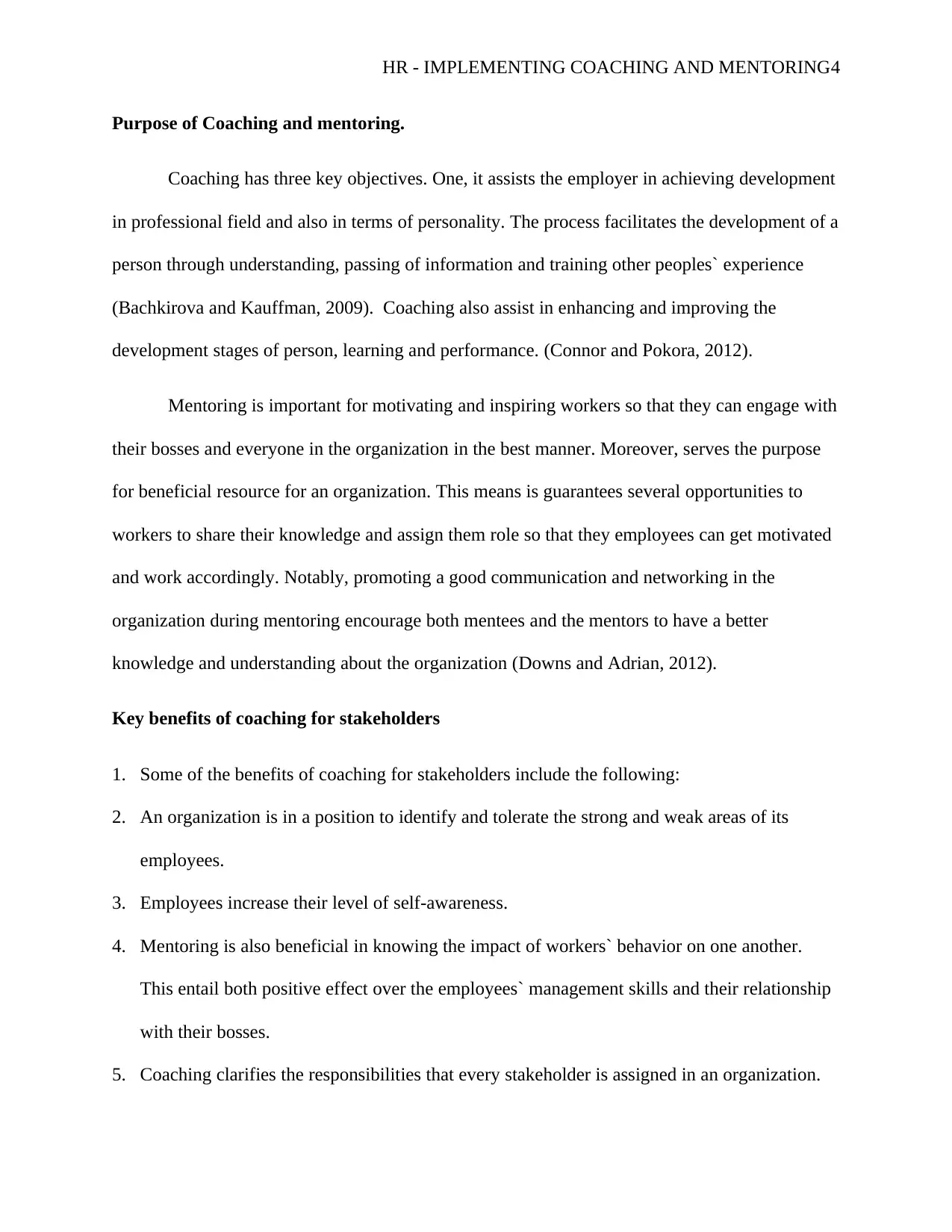
HR - IMPLEMENTING COACHING AND MENTORING4
Purpose of Coaching and mentoring.
Coaching has three key objectives. One, it assists the employer in achieving development
in professional field and also in terms of personality. The process facilitates the development of a
person through understanding, passing of information and training other peoples` experience
(Bachkirova and Kauffman, 2009). Coaching also assist in enhancing and improving the
development stages of person, learning and performance. (Connor and Pokora, 2012).
Mentoring is important for motivating and inspiring workers so that they can engage with
their bosses and everyone in the organization in the best manner. Moreover, serves the purpose
for beneficial resource for an organization. This means is guarantees several opportunities to
workers to share their knowledge and assign them role so that they employees can get motivated
and work accordingly. Notably, promoting a good communication and networking in the
organization during mentoring encourage both mentees and the mentors to have a better
knowledge and understanding about the organization (Downs and Adrian, 2012).
Key benefits of coaching for stakeholders
1. Some of the benefits of coaching for stakeholders include the following:
2. An organization is in a position to identify and tolerate the strong and weak areas of its
employees.
3. Employees increase their level of self-awareness.
4. Mentoring is also beneficial in knowing the impact of workers` behavior on one another.
This entail both positive effect over the employees` management skills and their relationship
with their bosses.
5. Coaching clarifies the responsibilities that every stakeholder is assigned in an organization.
Purpose of Coaching and mentoring.
Coaching has three key objectives. One, it assists the employer in achieving development
in professional field and also in terms of personality. The process facilitates the development of a
person through understanding, passing of information and training other peoples` experience
(Bachkirova and Kauffman, 2009). Coaching also assist in enhancing and improving the
development stages of person, learning and performance. (Connor and Pokora, 2012).
Mentoring is important for motivating and inspiring workers so that they can engage with
their bosses and everyone in the organization in the best manner. Moreover, serves the purpose
for beneficial resource for an organization. This means is guarantees several opportunities to
workers to share their knowledge and assign them role so that they employees can get motivated
and work accordingly. Notably, promoting a good communication and networking in the
organization during mentoring encourage both mentees and the mentors to have a better
knowledge and understanding about the organization (Downs and Adrian, 2012).
Key benefits of coaching for stakeholders
1. Some of the benefits of coaching for stakeholders include the following:
2. An organization is in a position to identify and tolerate the strong and weak areas of its
employees.
3. Employees increase their level of self-awareness.
4. Mentoring is also beneficial in knowing the impact of workers` behavior on one another.
This entail both positive effect over the employees` management skills and their relationship
with their bosses.
5. Coaching clarifies the responsibilities that every stakeholder is assigned in an organization.
Paraphrase This Document
Need a fresh take? Get an instant paraphrase of this document with our AI Paraphraser
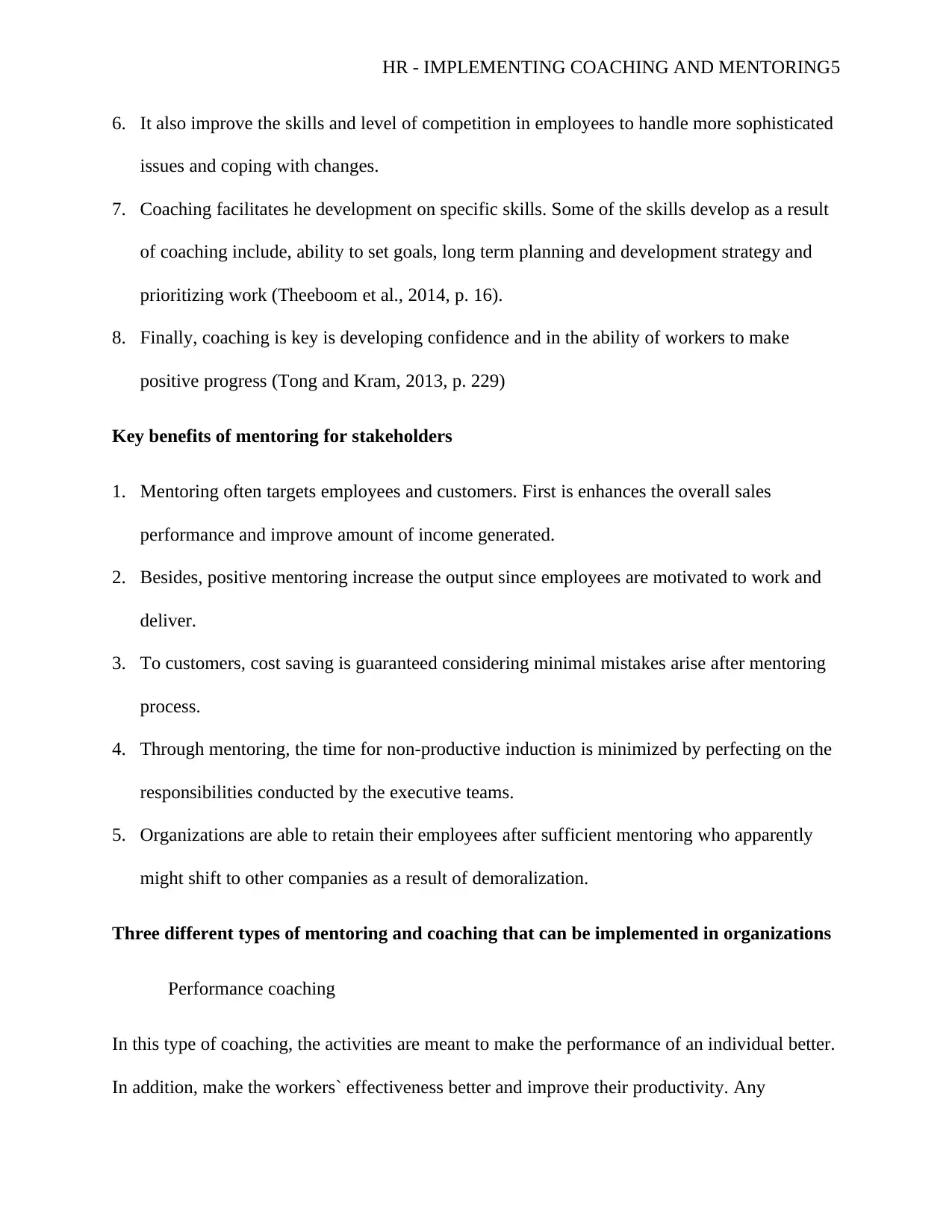
HR - IMPLEMENTING COACHING AND MENTORING5
6. It also improve the skills and level of competition in employees to handle more sophisticated
issues and coping with changes.
7. Coaching facilitates he development on specific skills. Some of the skills develop as a result
of coaching include, ability to set goals, long term planning and development strategy and
prioritizing work (Theeboom et al., 2014, p. 16).
8. Finally, coaching is key is developing confidence and in the ability of workers to make
positive progress (Tong and Kram, 2013, p. 229)
Key benefits of mentoring for stakeholders
1. Mentoring often targets employees and customers. First is enhances the overall sales
performance and improve amount of income generated.
2. Besides, positive mentoring increase the output since employees are motivated to work and
deliver.
3. To customers, cost saving is guaranteed considering minimal mistakes arise after mentoring
process.
4. Through mentoring, the time for non-productive induction is minimized by perfecting on the
responsibilities conducted by the executive teams.
5. Organizations are able to retain their employees after sufficient mentoring who apparently
might shift to other companies as a result of demoralization.
Three different types of mentoring and coaching that can be implemented in organizations
Performance coaching
In this type of coaching, the activities are meant to make the performance of an individual better.
In addition, make the workers` effectiveness better and improve their productivity. Any
6. It also improve the skills and level of competition in employees to handle more sophisticated
issues and coping with changes.
7. Coaching facilitates he development on specific skills. Some of the skills develop as a result
of coaching include, ability to set goals, long term planning and development strategy and
prioritizing work (Theeboom et al., 2014, p. 16).
8. Finally, coaching is key is developing confidence and in the ability of workers to make
positive progress (Tong and Kram, 2013, p. 229)
Key benefits of mentoring for stakeholders
1. Mentoring often targets employees and customers. First is enhances the overall sales
performance and improve amount of income generated.
2. Besides, positive mentoring increase the output since employees are motivated to work and
deliver.
3. To customers, cost saving is guaranteed considering minimal mistakes arise after mentoring
process.
4. Through mentoring, the time for non-productive induction is minimized by perfecting on the
responsibilities conducted by the executive teams.
5. Organizations are able to retain their employees after sufficient mentoring who apparently
might shift to other companies as a result of demoralization.
Three different types of mentoring and coaching that can be implemented in organizations
Performance coaching
In this type of coaching, the activities are meant to make the performance of an individual better.
In addition, make the workers` effectiveness better and improve their productivity. Any
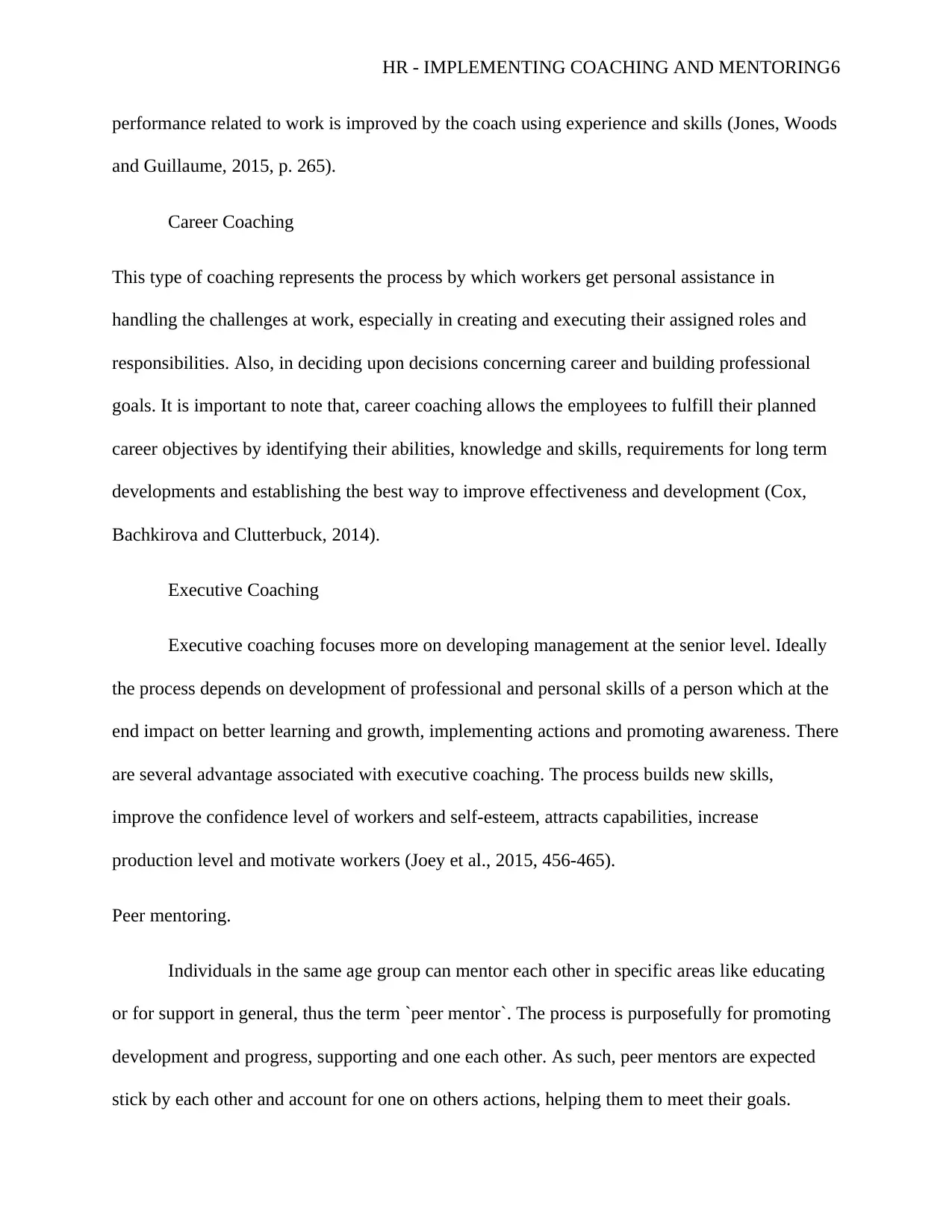
HR - IMPLEMENTING COACHING AND MENTORING6
performance related to work is improved by the coach using experience and skills (Jones, Woods
and Guillaume, 2015, p. 265).
Career Coaching
This type of coaching represents the process by which workers get personal assistance in
handling the challenges at work, especially in creating and executing their assigned roles and
responsibilities. Also, in deciding upon decisions concerning career and building professional
goals. It is important to note that, career coaching allows the employees to fulfill their planned
career objectives by identifying their abilities, knowledge and skills, requirements for long term
developments and establishing the best way to improve effectiveness and development (Cox,
Bachkirova and Clutterbuck, 2014).
Executive Coaching
Executive coaching focuses more on developing management at the senior level. Ideally
the process depends on development of professional and personal skills of a person which at the
end impact on better learning and growth, implementing actions and promoting awareness. There
are several advantage associated with executive coaching. The process builds new skills,
improve the confidence level of workers and self-esteem, attracts capabilities, increase
production level and motivate workers (Joey et al., 2015, 456-465).
Peer mentoring.
Individuals in the same age group can mentor each other in specific areas like educating
or for support in general, thus the term `peer mentor`. The process is purposefully for promoting
development and progress, supporting and one each other. As such, peer mentors are expected
stick by each other and account for one on others actions, helping them to meet their goals.
performance related to work is improved by the coach using experience and skills (Jones, Woods
and Guillaume, 2015, p. 265).
Career Coaching
This type of coaching represents the process by which workers get personal assistance in
handling the challenges at work, especially in creating and executing their assigned roles and
responsibilities. Also, in deciding upon decisions concerning career and building professional
goals. It is important to note that, career coaching allows the employees to fulfill their planned
career objectives by identifying their abilities, knowledge and skills, requirements for long term
developments and establishing the best way to improve effectiveness and development (Cox,
Bachkirova and Clutterbuck, 2014).
Executive Coaching
Executive coaching focuses more on developing management at the senior level. Ideally
the process depends on development of professional and personal skills of a person which at the
end impact on better learning and growth, implementing actions and promoting awareness. There
are several advantage associated with executive coaching. The process builds new skills,
improve the confidence level of workers and self-esteem, attracts capabilities, increase
production level and motivate workers (Joey et al., 2015, 456-465).
Peer mentoring.
Individuals in the same age group can mentor each other in specific areas like educating
or for support in general, thus the term `peer mentor`. The process is purposefully for promoting
development and progress, supporting and one each other. As such, peer mentors are expected
stick by each other and account for one on others actions, helping them to meet their goals.
⊘ This is a preview!⊘
Do you want full access?
Subscribe today to unlock all pages.

Trusted by 1+ million students worldwide
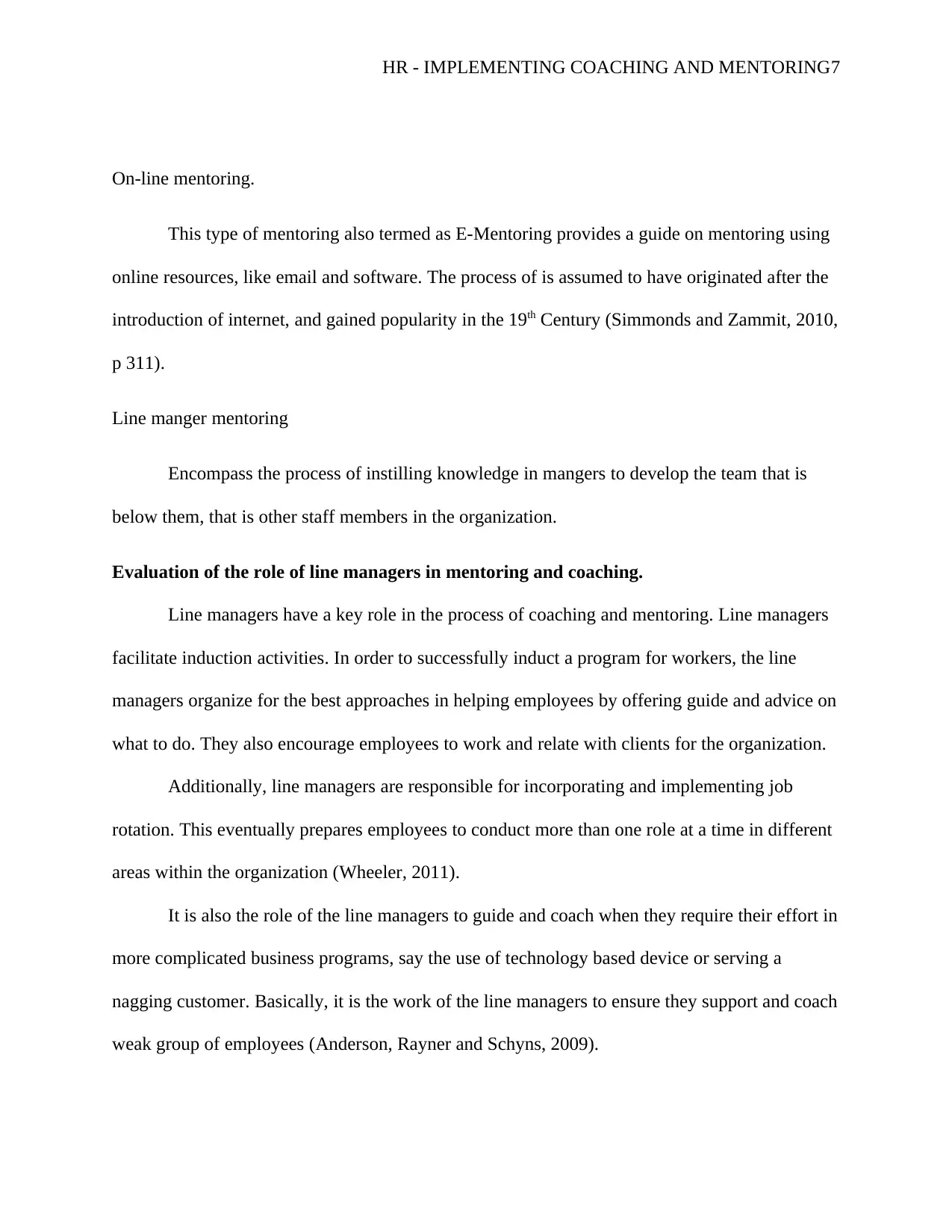
HR - IMPLEMENTING COACHING AND MENTORING7
On-line mentoring.
This type of mentoring also termed as E-Mentoring provides a guide on mentoring using
online resources, like email and software. The process of is assumed to have originated after the
introduction of internet, and gained popularity in the 19th Century (Simmonds and Zammit, 2010,
p 311).
Line manger mentoring
Encompass the process of instilling knowledge in mangers to develop the team that is
below them, that is other staff members in the organization.
Evaluation of the role of line managers in mentoring and coaching.
Line managers have a key role in the process of coaching and mentoring. Line managers
facilitate induction activities. In order to successfully induct a program for workers, the line
managers organize for the best approaches in helping employees by offering guide and advice on
what to do. They also encourage employees to work and relate with clients for the organization.
Additionally, line managers are responsible for incorporating and implementing job
rotation. This eventually prepares employees to conduct more than one role at a time in different
areas within the organization (Wheeler, 2011).
It is also the role of the line managers to guide and coach when they require their effort in
more complicated business programs, say the use of technology based device or serving a
nagging customer. Basically, it is the work of the line managers to ensure they support and coach
weak group of employees (Anderson, Rayner and Schyns, 2009).
On-line mentoring.
This type of mentoring also termed as E-Mentoring provides a guide on mentoring using
online resources, like email and software. The process of is assumed to have originated after the
introduction of internet, and gained popularity in the 19th Century (Simmonds and Zammit, 2010,
p 311).
Line manger mentoring
Encompass the process of instilling knowledge in mangers to develop the team that is
below them, that is other staff members in the organization.
Evaluation of the role of line managers in mentoring and coaching.
Line managers have a key role in the process of coaching and mentoring. Line managers
facilitate induction activities. In order to successfully induct a program for workers, the line
managers organize for the best approaches in helping employees by offering guide and advice on
what to do. They also encourage employees to work and relate with clients for the organization.
Additionally, line managers are responsible for incorporating and implementing job
rotation. This eventually prepares employees to conduct more than one role at a time in different
areas within the organization (Wheeler, 2011).
It is also the role of the line managers to guide and coach when they require their effort in
more complicated business programs, say the use of technology based device or serving a
nagging customer. Basically, it is the work of the line managers to ensure they support and coach
weak group of employees (Anderson, Rayner and Schyns, 2009).
Paraphrase This Document
Need a fresh take? Get an instant paraphrase of this document with our AI Paraphraser
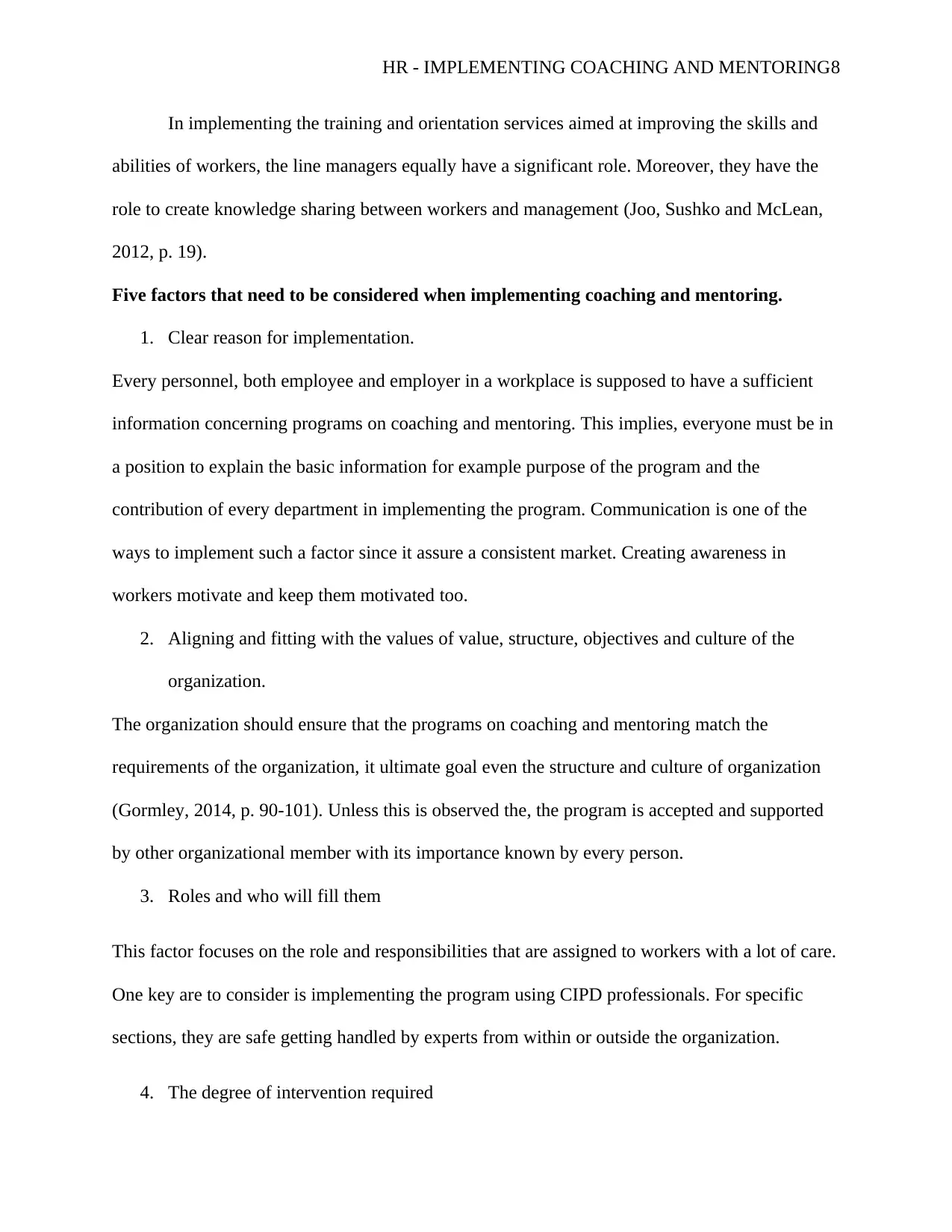
HR - IMPLEMENTING COACHING AND MENTORING8
In implementing the training and orientation services aimed at improving the skills and
abilities of workers, the line managers equally have a significant role. Moreover, they have the
role to create knowledge sharing between workers and management (Joo, Sushko and McLean,
2012, p. 19).
Five factors that need to be considered when implementing coaching and mentoring.
1. Clear reason for implementation.
Every personnel, both employee and employer in a workplace is supposed to have a sufficient
information concerning programs on coaching and mentoring. This implies, everyone must be in
a position to explain the basic information for example purpose of the program and the
contribution of every department in implementing the program. Communication is one of the
ways to implement such a factor since it assure a consistent market. Creating awareness in
workers motivate and keep them motivated too.
2. Aligning and fitting with the values of value, structure, objectives and culture of the
organization.
The organization should ensure that the programs on coaching and mentoring match the
requirements of the organization, it ultimate goal even the structure and culture of organization
(Gormley, 2014, p. 90-101). Unless this is observed the, the program is accepted and supported
by other organizational member with its importance known by every person.
3. Roles and who will fill them
This factor focuses on the role and responsibilities that are assigned to workers with a lot of care.
One key are to consider is implementing the program using CIPD professionals. For specific
sections, they are safe getting handled by experts from within or outside the organization.
4. The degree of intervention required
In implementing the training and orientation services aimed at improving the skills and
abilities of workers, the line managers equally have a significant role. Moreover, they have the
role to create knowledge sharing between workers and management (Joo, Sushko and McLean,
2012, p. 19).
Five factors that need to be considered when implementing coaching and mentoring.
1. Clear reason for implementation.
Every personnel, both employee and employer in a workplace is supposed to have a sufficient
information concerning programs on coaching and mentoring. This implies, everyone must be in
a position to explain the basic information for example purpose of the program and the
contribution of every department in implementing the program. Communication is one of the
ways to implement such a factor since it assure a consistent market. Creating awareness in
workers motivate and keep them motivated too.
2. Aligning and fitting with the values of value, structure, objectives and culture of the
organization.
The organization should ensure that the programs on coaching and mentoring match the
requirements of the organization, it ultimate goal even the structure and culture of organization
(Gormley, 2014, p. 90-101). Unless this is observed the, the program is accepted and supported
by other organizational member with its importance known by every person.
3. Roles and who will fill them
This factor focuses on the role and responsibilities that are assigned to workers with a lot of care.
One key are to consider is implementing the program using CIPD professionals. For specific
sections, they are safe getting handled by experts from within or outside the organization.
4. The degree of intervention required
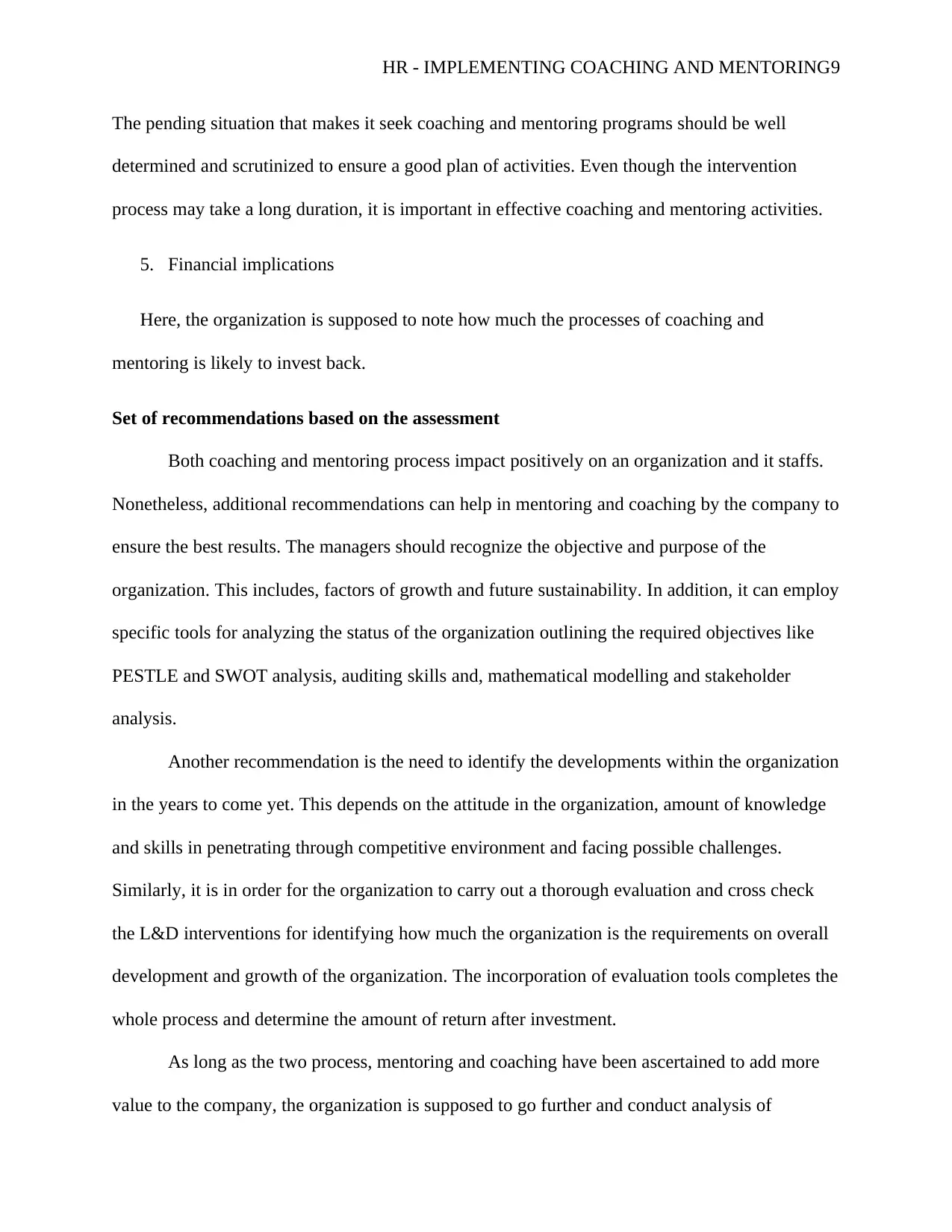
HR - IMPLEMENTING COACHING AND MENTORING9
The pending situation that makes it seek coaching and mentoring programs should be well
determined and scrutinized to ensure a good plan of activities. Even though the intervention
process may take a long duration, it is important in effective coaching and mentoring activities.
5. Financial implications
Here, the organization is supposed to note how much the processes of coaching and
mentoring is likely to invest back.
Set of recommendations based on the assessment
Both coaching and mentoring process impact positively on an organization and it staffs.
Nonetheless, additional recommendations can help in mentoring and coaching by the company to
ensure the best results. The managers should recognize the objective and purpose of the
organization. This includes, factors of growth and future sustainability. In addition, it can employ
specific tools for analyzing the status of the organization outlining the required objectives like
PESTLE and SWOT analysis, auditing skills and, mathematical modelling and stakeholder
analysis.
Another recommendation is the need to identify the developments within the organization
in the years to come yet. This depends on the attitude in the organization, amount of knowledge
and skills in penetrating through competitive environment and facing possible challenges.
Similarly, it is in order for the organization to carry out a thorough evaluation and cross check
the L&D interventions for identifying how much the organization is the requirements on overall
development and growth of the organization. The incorporation of evaluation tools completes the
whole process and determine the amount of return after investment.
As long as the two process, mentoring and coaching have been ascertained to add more
value to the company, the organization is supposed to go further and conduct analysis of
The pending situation that makes it seek coaching and mentoring programs should be well
determined and scrutinized to ensure a good plan of activities. Even though the intervention
process may take a long duration, it is important in effective coaching and mentoring activities.
5. Financial implications
Here, the organization is supposed to note how much the processes of coaching and
mentoring is likely to invest back.
Set of recommendations based on the assessment
Both coaching and mentoring process impact positively on an organization and it staffs.
Nonetheless, additional recommendations can help in mentoring and coaching by the company to
ensure the best results. The managers should recognize the objective and purpose of the
organization. This includes, factors of growth and future sustainability. In addition, it can employ
specific tools for analyzing the status of the organization outlining the required objectives like
PESTLE and SWOT analysis, auditing skills and, mathematical modelling and stakeholder
analysis.
Another recommendation is the need to identify the developments within the organization
in the years to come yet. This depends on the attitude in the organization, amount of knowledge
and skills in penetrating through competitive environment and facing possible challenges.
Similarly, it is in order for the organization to carry out a thorough evaluation and cross check
the L&D interventions for identifying how much the organization is the requirements on overall
development and growth of the organization. The incorporation of evaluation tools completes the
whole process and determine the amount of return after investment.
As long as the two process, mentoring and coaching have been ascertained to add more
value to the company, the organization is supposed to go further and conduct analysis of
⊘ This is a preview!⊘
Do you want full access?
Subscribe today to unlock all pages.

Trusted by 1+ million students worldwide
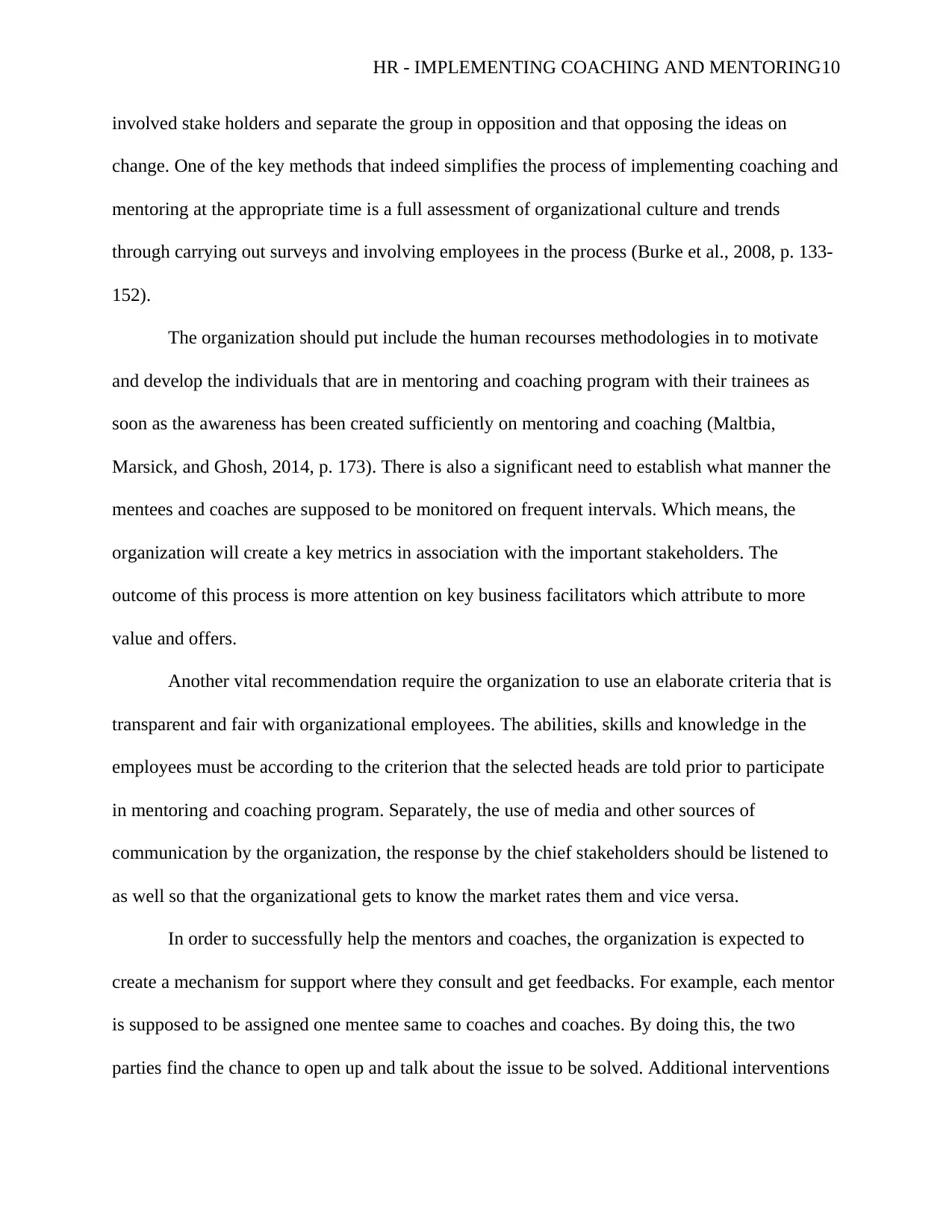
HR - IMPLEMENTING COACHING AND MENTORING10
involved stake holders and separate the group in opposition and that opposing the ideas on
change. One of the key methods that indeed simplifies the process of implementing coaching and
mentoring at the appropriate time is a full assessment of organizational culture and trends
through carrying out surveys and involving employees in the process (Burke et al., 2008, p. 133-
152).
The organization should put include the human recourses methodologies in to motivate
and develop the individuals that are in mentoring and coaching program with their trainees as
soon as the awareness has been created sufficiently on mentoring and coaching (Maltbia,
Marsick, and Ghosh, 2014, p. 173). There is also a significant need to establish what manner the
mentees and coaches are supposed to be monitored on frequent intervals. Which means, the
organization will create a key metrics in association with the important stakeholders. The
outcome of this process is more attention on key business facilitators which attribute to more
value and offers.
Another vital recommendation require the organization to use an elaborate criteria that is
transparent and fair with organizational employees. The abilities, skills and knowledge in the
employees must be according to the criterion that the selected heads are told prior to participate
in mentoring and coaching program. Separately, the use of media and other sources of
communication by the organization, the response by the chief stakeholders should be listened to
as well so that the organizational gets to know the market rates them and vice versa.
In order to successfully help the mentors and coaches, the organization is expected to
create a mechanism for support where they consult and get feedbacks. For example, each mentor
is supposed to be assigned one mentee same to coaches and coaches. By doing this, the two
parties find the chance to open up and talk about the issue to be solved. Additional interventions
involved stake holders and separate the group in opposition and that opposing the ideas on
change. One of the key methods that indeed simplifies the process of implementing coaching and
mentoring at the appropriate time is a full assessment of organizational culture and trends
through carrying out surveys and involving employees in the process (Burke et al., 2008, p. 133-
152).
The organization should put include the human recourses methodologies in to motivate
and develop the individuals that are in mentoring and coaching program with their trainees as
soon as the awareness has been created sufficiently on mentoring and coaching (Maltbia,
Marsick, and Ghosh, 2014, p. 173). There is also a significant need to establish what manner the
mentees and coaches are supposed to be monitored on frequent intervals. Which means, the
organization will create a key metrics in association with the important stakeholders. The
outcome of this process is more attention on key business facilitators which attribute to more
value and offers.
Another vital recommendation require the organization to use an elaborate criteria that is
transparent and fair with organizational employees. The abilities, skills and knowledge in the
employees must be according to the criterion that the selected heads are told prior to participate
in mentoring and coaching program. Separately, the use of media and other sources of
communication by the organization, the response by the chief stakeholders should be listened to
as well so that the organizational gets to know the market rates them and vice versa.
In order to successfully help the mentors and coaches, the organization is expected to
create a mechanism for support where they consult and get feedbacks. For example, each mentor
is supposed to be assigned one mentee same to coaches and coaches. By doing this, the two
parties find the chance to open up and talk about the issue to be solved. Additional interventions
Paraphrase This Document
Need a fresh take? Get an instant paraphrase of this document with our AI Paraphraser
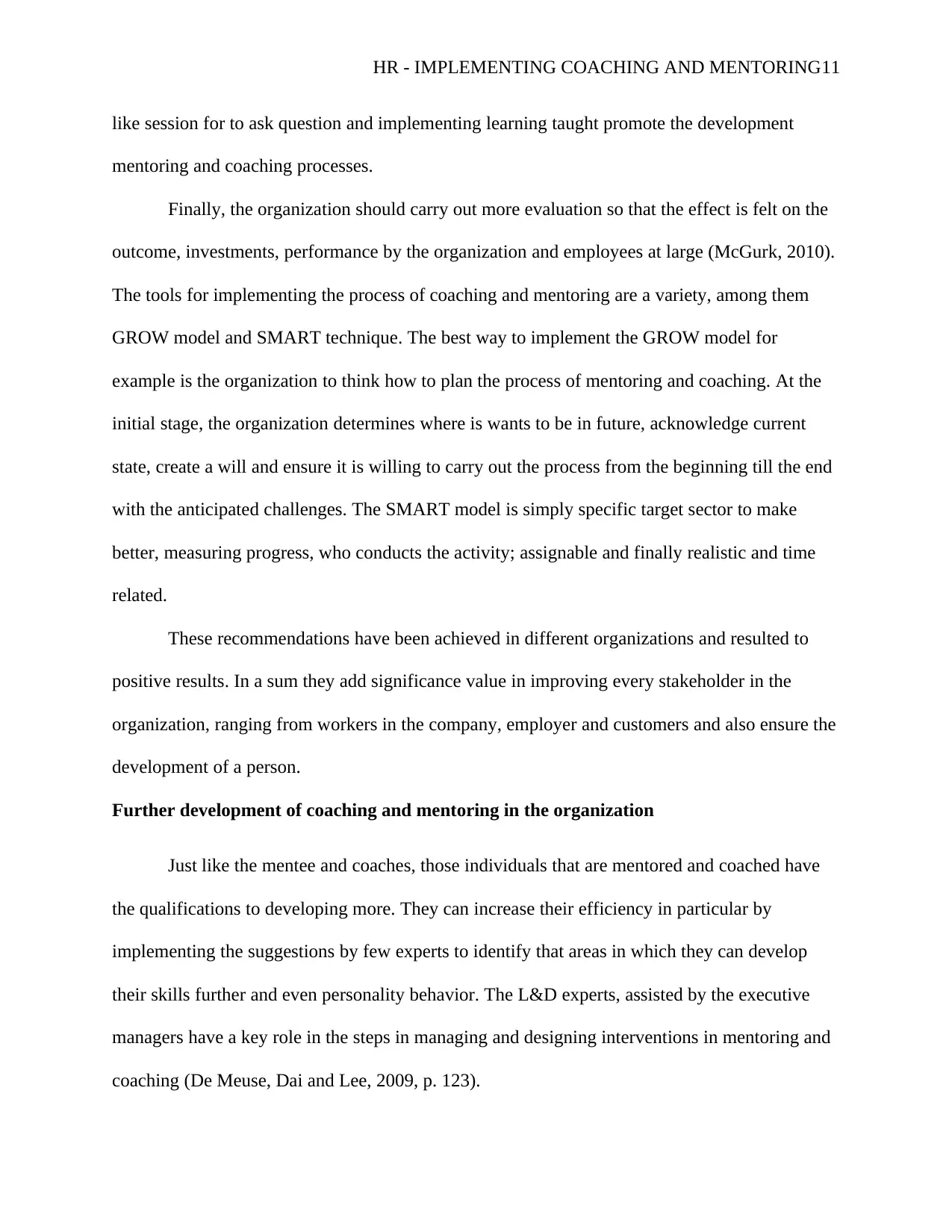
HR - IMPLEMENTING COACHING AND MENTORING11
like session for to ask question and implementing learning taught promote the development
mentoring and coaching processes.
Finally, the organization should carry out more evaluation so that the effect is felt on the
outcome, investments, performance by the organization and employees at large (McGurk, 2010).
The tools for implementing the process of coaching and mentoring are a variety, among them
GROW model and SMART technique. The best way to implement the GROW model for
example is the organization to think how to plan the process of mentoring and coaching. At the
initial stage, the organization determines where is wants to be in future, acknowledge current
state, create a will and ensure it is willing to carry out the process from the beginning till the end
with the anticipated challenges. The SMART model is simply specific target sector to make
better, measuring progress, who conducts the activity; assignable and finally realistic and time
related.
These recommendations have been achieved in different organizations and resulted to
positive results. In a sum they add significance value in improving every stakeholder in the
organization, ranging from workers in the company, employer and customers and also ensure the
development of a person.
Further development of coaching and mentoring in the organization
Just like the mentee and coaches, those individuals that are mentored and coached have
the qualifications to developing more. They can increase their efficiency in particular by
implementing the suggestions by few experts to identify that areas in which they can develop
their skills further and even personality behavior. The L&D experts, assisted by the executive
managers have a key role in the steps in managing and designing interventions in mentoring and
coaching (De Meuse, Dai and Lee, 2009, p. 123).
like session for to ask question and implementing learning taught promote the development
mentoring and coaching processes.
Finally, the organization should carry out more evaluation so that the effect is felt on the
outcome, investments, performance by the organization and employees at large (McGurk, 2010).
The tools for implementing the process of coaching and mentoring are a variety, among them
GROW model and SMART technique. The best way to implement the GROW model for
example is the organization to think how to plan the process of mentoring and coaching. At the
initial stage, the organization determines where is wants to be in future, acknowledge current
state, create a will and ensure it is willing to carry out the process from the beginning till the end
with the anticipated challenges. The SMART model is simply specific target sector to make
better, measuring progress, who conducts the activity; assignable and finally realistic and time
related.
These recommendations have been achieved in different organizations and resulted to
positive results. In a sum they add significance value in improving every stakeholder in the
organization, ranging from workers in the company, employer and customers and also ensure the
development of a person.
Further development of coaching and mentoring in the organization
Just like the mentee and coaches, those individuals that are mentored and coached have
the qualifications to developing more. They can increase their efficiency in particular by
implementing the suggestions by few experts to identify that areas in which they can develop
their skills further and even personality behavior. The L&D experts, assisted by the executive
managers have a key role in the steps in managing and designing interventions in mentoring and
coaching (De Meuse, Dai and Lee, 2009, p. 123).
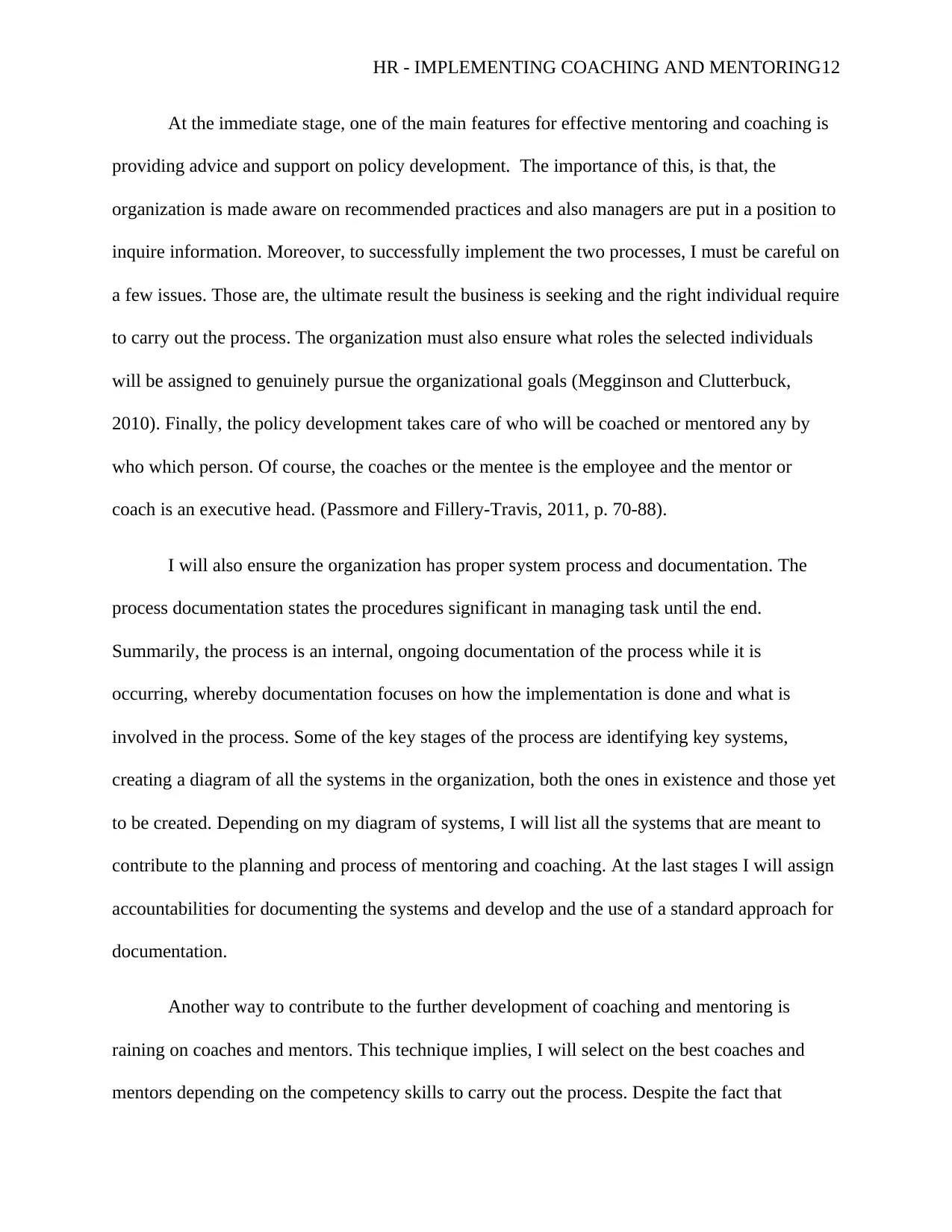
HR - IMPLEMENTING COACHING AND MENTORING12
At the immediate stage, one of the main features for effective mentoring and coaching is
providing advice and support on policy development. The importance of this, is that, the
organization is made aware on recommended practices and also managers are put in a position to
inquire information. Moreover, to successfully implement the two processes, I must be careful on
a few issues. Those are, the ultimate result the business is seeking and the right individual require
to carry out the process. The organization must also ensure what roles the selected individuals
will be assigned to genuinely pursue the organizational goals (Megginson and Clutterbuck,
2010). Finally, the policy development takes care of who will be coached or mentored any by
who which person. Of course, the coaches or the mentee is the employee and the mentor or
coach is an executive head. (Passmore and Fillery-Travis, 2011, p. 70-88).
I will also ensure the organization has proper system process and documentation. The
process documentation states the procedures significant in managing task until the end.
Summarily, the process is an internal, ongoing documentation of the process while it is
occurring, whereby documentation focuses on how the implementation is done and what is
involved in the process. Some of the key stages of the process are identifying key systems,
creating a diagram of all the systems in the organization, both the ones in existence and those yet
to be created. Depending on my diagram of systems, I will list all the systems that are meant to
contribute to the planning and process of mentoring and coaching. At the last stages I will assign
accountabilities for documenting the systems and develop and the use of a standard approach for
documentation.
Another way to contribute to the further development of coaching and mentoring is
raining on coaches and mentors. This technique implies, I will select on the best coaches and
mentors depending on the competency skills to carry out the process. Despite the fact that
At the immediate stage, one of the main features for effective mentoring and coaching is
providing advice and support on policy development. The importance of this, is that, the
organization is made aware on recommended practices and also managers are put in a position to
inquire information. Moreover, to successfully implement the two processes, I must be careful on
a few issues. Those are, the ultimate result the business is seeking and the right individual require
to carry out the process. The organization must also ensure what roles the selected individuals
will be assigned to genuinely pursue the organizational goals (Megginson and Clutterbuck,
2010). Finally, the policy development takes care of who will be coached or mentored any by
who which person. Of course, the coaches or the mentee is the employee and the mentor or
coach is an executive head. (Passmore and Fillery-Travis, 2011, p. 70-88).
I will also ensure the organization has proper system process and documentation. The
process documentation states the procedures significant in managing task until the end.
Summarily, the process is an internal, ongoing documentation of the process while it is
occurring, whereby documentation focuses on how the implementation is done and what is
involved in the process. Some of the key stages of the process are identifying key systems,
creating a diagram of all the systems in the organization, both the ones in existence and those yet
to be created. Depending on my diagram of systems, I will list all the systems that are meant to
contribute to the planning and process of mentoring and coaching. At the last stages I will assign
accountabilities for documenting the systems and develop and the use of a standard approach for
documentation.
Another way to contribute to the further development of coaching and mentoring is
raining on coaches and mentors. This technique implies, I will select on the best coaches and
mentors depending on the competency skills to carry out the process. Despite the fact that
⊘ This is a preview!⊘
Do you want full access?
Subscribe today to unlock all pages.

Trusted by 1+ million students worldwide
1 out of 17
Related Documents
Your All-in-One AI-Powered Toolkit for Academic Success.
+13062052269
info@desklib.com
Available 24*7 on WhatsApp / Email
![[object Object]](/_next/static/media/star-bottom.7253800d.svg)
Unlock your academic potential
Copyright © 2020–2026 A2Z Services. All Rights Reserved. Developed and managed by ZUCOL.




